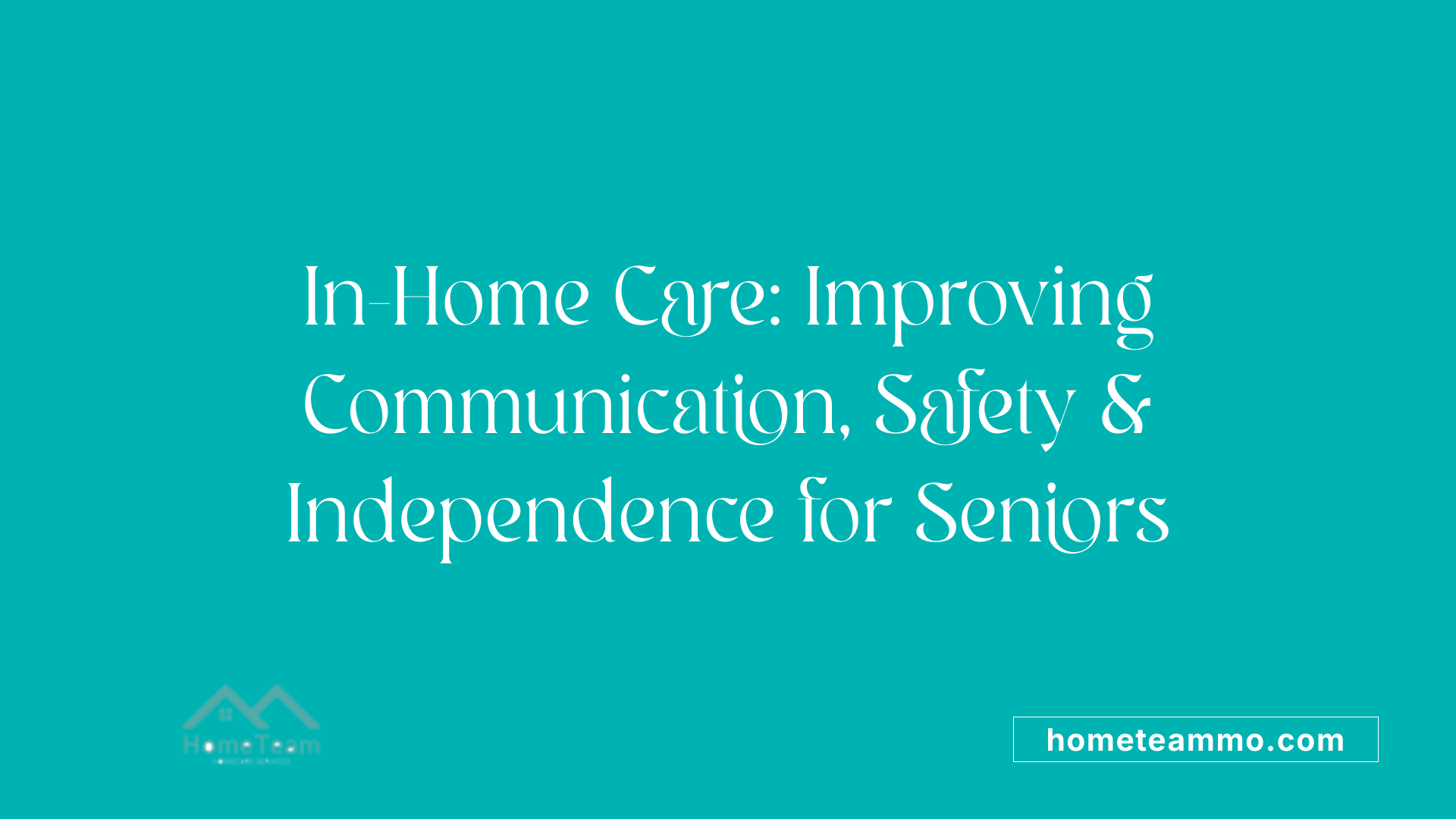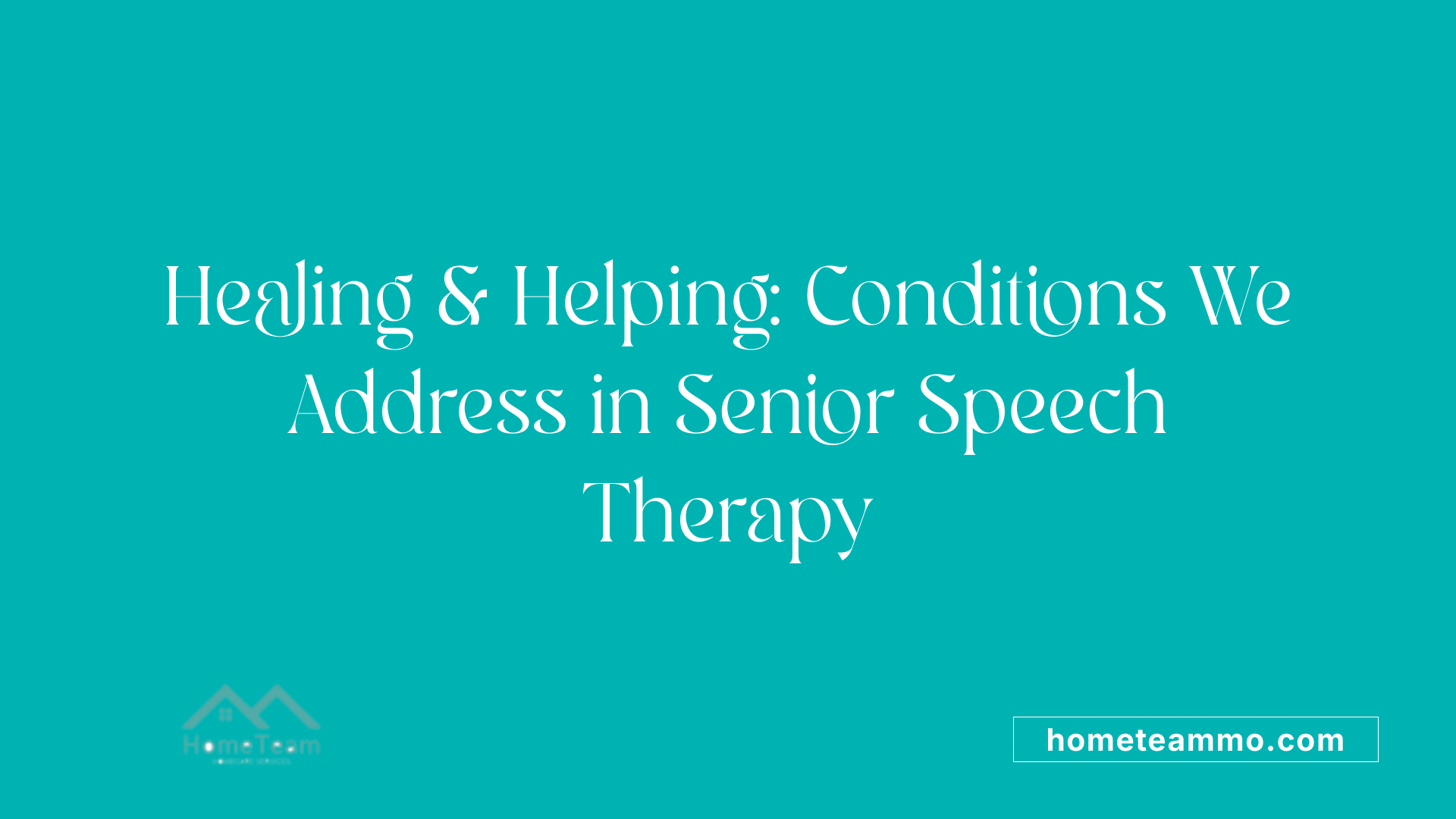How In-Home Care Services Help Seniors with Speech Impairments
Empowering Seniors Through Personalized In-Home Speech Care

Understanding the Role of In-Home Speech Therapy for Elderly Communication
As seniors age, many experience speech and swallowing difficulties stemming from neurological conditions, illnesses, or age-related changes. In-home care services offer a tailored approach to addressing these challenges, providing accessible, effective, and compassionate support designed to enhance communication, safety, and independence.
Benefits of In-Home Speech Therapy for Seniors

What are the benefits of receiving in-home speech therapy for seniors?
In-home speech therapy provides seniors with a range of advantages that can significantly improve their quality of life. One of the main benefits is the ability to receive personalized care tailored to their unique needs while in a familiar setting. This environment helps reduce anxiety and encourages more active participation in therapy sessions.
This form of therapy aims to enhance communication skills and address swallowing issues, which are common in elderly populations dealing with strokes, dementia, or neurological conditions. Improving vocal quality and speech clarity not only boosts confidence but also supports safer eating and drinking, lowering the risk of choking and aspiration.
Another major advantage is the reduction of transportation barriers. Many seniors face mobility challenges or lack access to reliable transportation, and in-home therapy eliminates these hurdles, ensuring consistent treatment and progress. The convenience of receiving therapy at home also allows for more flexible scheduling.
Social engagement and emotional well-being are further supported through in-home sessions. When seniors can communicate better, they are more likely to engage in daily activities and connect with loved ones. This improved ability to socialize can reduce feelings of loneliness and depression.
Moreover, in-home speech therapy plays an essential role in helping seniors maintain independence. By strengthening communication and swallowing functions, it helps seniors manage their health more effectively, potentially reducing the need for institutional care.
In summary, in-home speech therapy for seniors fosters a comfortable, accessible, and effective approach to treatment. It improves communication and swallowing functions, promotes social connection, and supports overall independence and health safety, making everyday life easier and more fulfilling for aging individuals.
Conditions Addressed and Challenges Treated Through In-Home Speech Therapy

What conditions and communication challenges are treated with speech therapy in home care for seniors?
In-home speech therapy for seniors is designed to address a variety of health conditions that affect communication, swallowing, and cognitive functions. Many of these conditions stem from neurological issues or age-related changes, and targeted therapy can significantly improve quality of life.
Common conditions include stroke, Parkinson’s disease, dementia, traumatic brain injuries, and neurological disorders such as ALS (amyotrophic lateral sclerosis). Seniors with head and neck cancers or recovering from cancer surgeries also benefit from specialized speech therapy. These health issues often result in difficulties with speaking, understanding language, or swallowing safely.
Speech therapy evaluates and treats issues like aphasia, which impairs language expression; dysarthria, which causes slurred or slow speech; and articulation disorders that affect clarity. Swallowing problems, including dysphagia and choking risks, are also addressed, helping seniors eat safely and comfortably.
Cognitive-communication impairments—such as response delays, memory problems, decreased attention, and coordination issues—stem from neurological disorders. These challenges can interfere with everyday conversations, decision-making, and safety during meals.
Therapists develop personalized treatment plans to target each senior’s unique needs. Techniques may include speech exercises to improve clarity and strength, swallowing training, and using alternative communication methods like gestures, visual aids, or communication devices.
Lifestyle adjustments, such as modifying food textures or eating environments, contribute to safer swallowing and eating habits. Family members are actively involved in therapy, offering additional support and encouraging progress.
Overall, in-home speech therapy strives to restore or optimize communication and swallowing skills, helping seniors maintain independence, participate actively in daily life, and stay safe during meals. The tailored approach ensures that each individual’s specific challenges are addressed with strategies that fit their environment and lifestyle.
Techniques and Strategies Used in In-Home Speech Therapy
 In-home speech therapy for seniors utilizes a variety of methods tailored to each individual's needs to improve communication, voice, and swallowing skills. Speech and voice exercises are fundamental, focusing on strengthening muscles used in speech and respiration. Language activities help enhance vocabulary, sentence structure, and conversational skills, while cognitive-communication therapy addresses thinking, memory, and problem-solving related to communication.
In-home speech therapy for seniors utilizes a variety of methods tailored to each individual's needs to improve communication, voice, and swallowing skills. Speech and voice exercises are fundamental, focusing on strengthening muscles used in speech and respiration. Language activities help enhance vocabulary, sentence structure, and conversational skills, while cognitive-communication therapy addresses thinking, memory, and problem-solving related to communication.
Therapists often incorporate visual aids such as picture cards, communication boards, or digital tools to support understanding and expression. Adaptive devices like speech-generating devices and communication apps play an increasing role in helping non-verbal seniors communicate effectively.
Family involvement is crucial. Training family members to assist with daily practice routines ensures consistency and reinforces progress. Therapists recommend integrating exercises into daily activities, such as during meals, walks, or leisure, making therapy practical and relevant.
Beyond exercises, strategies like positive reinforcement, modeling appropriate speech behaviors, and minimizing environmental distractions foster a supportive atmosphere. Techniques may also include food texture modifications for swallowing safety and the use of cues or prompts to initiate speech.
Overall, a personalized approach combining these techniques enhances the effectiveness of in-home speech therapy, promoting better skills retention and quality of life for seniors.
Impact of Speech Therapy on Seniors’ Quality of Life

How does speech therapy impact seniors’ quality of life and independence?
Speech therapy plays a crucial role in enhancing the overall well-being of seniors by addressing challenges related to communication, swallowing, and cognition. It helps seniors regain or maintain their ability to communicate effectively, which is essential for social participation and emotional health.
Improved speech clarity and voice quality enable seniors to interact confidently with family, friends, and caregivers. This reduces feelings of loneliness and isolation, fostering stronger social bonds. Moreover, therapy can help prevent accidents related to swallowing difficulties, such as choking, thereby increasing safety during meals and daily activities.
Therapists tailor exercises to strengthen oral muscles and improve cognitive functions like memory and attention. These improvements support the seniors’ independence in managing daily tasks, from self-care to navigating around their home safely.
Conditions like neurological disorders, age-related muscle changes, and recovery from illnesses are also managed effectively through speech therapy, which aids in maintaining health and functional autonomy.
Overall, by enhancing communication skills, supporting safety, and fostering emotional resilience, speech therapy significantly boosts seniors’ quality of life, helping them stay active, engaged, and independent in their daily routines.
Support Systems and Service Delivery in In-Home Speech Therapy

Who are the professionals involved in delivering in-home speech therapy for seniors?
The core professionals providing in-home speech therapy are licensed speech-language pathologists (SLPs). These trained specialists assess, diagnose, and treat various communication and swallowing disorders in older adults.
SLPs develop customized treatment plans based on thorough evaluations of each patient's specific needs. They then deliver targeted therapy exercises and techniques directly in the comfort of the patient's home, helping to enhance speech, language, and swallowing abilities.
In addition to SLPs, other healthcare professionals often play a collaborative role. These include nurses, physical therapists, occupational therapists, and social workers, all working together to provide holistic care tailored for the senior's overall health.
Family members and caregivers are integral to the process, helping facilitate daily practice, support exercises, and reinforce progress between therapy sessions. Their involvement not only boosts therapy effectiveness but also ensures that therapeutic techniques are consistently applied.
Furthermore, physicians or primary care providers are essential for providing the official medical orders necessary for therapy approval. They oversee the treatment plan, ensuring that therapy aligns with medical conditions and insurance requirements.
This team-based approach fosters comprehensive care, ensuring seniors receive not only effective therapy but also the support and coordination needed to maintain their independence and improve their quality of life.
Enhancing Communication and Independence Through Tailored In-Home Support
In-home speech therapy services play a critical role in helping seniors overcome communication and swallowing challenges, thereby improving their quality of life, safety, and independence. Through assessments, personalized treatment plans, and innovative techniques, licensed speech-language pathologists work closely with family caregivers to deliver care directly in the comfort of home. This approach not only provides convenience and emotional reassurance but also fosters meaningful social interactions and supports ongoing health management. As a result, seniors are empowered to maintain their dignity, remain connected with loved ones, and enjoy a higher quality of life well into their later years.
References
- In-Home Speech Therapy with Home Health Care - Amedisys
- 5 Speech Therapy Steps to Help Seniors Communicate Better After ...
- Benefits of At-Home Speech Therapy for Seniors - FellowshipLIFE
- Supporting Seniors with Visual or Speech Challenges
- Best Speech Therapy | Self-Help
- In-Home Care for Adults and Seniors Living with Disabilities
- Home Health Services Coverage - Medicare
- Speech Therapy and Home Health | Active Home Health & Hospice

How to Plan for Long-Term Home Care Services

How Home Team Helps Families Make Informed Care Decisions

How Home Team's Caregivers Provide Peace of Mind for Families



